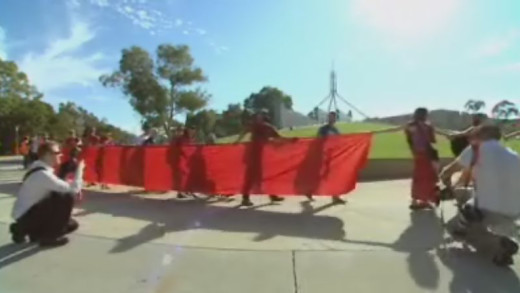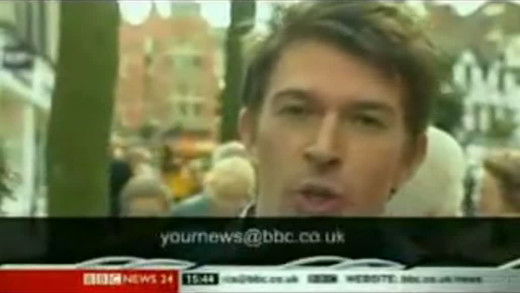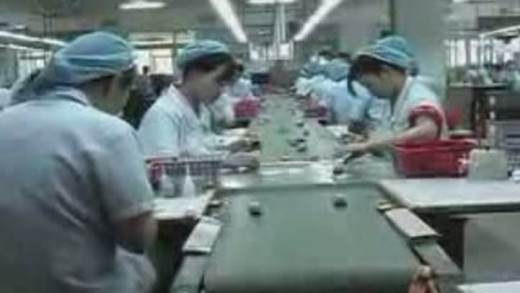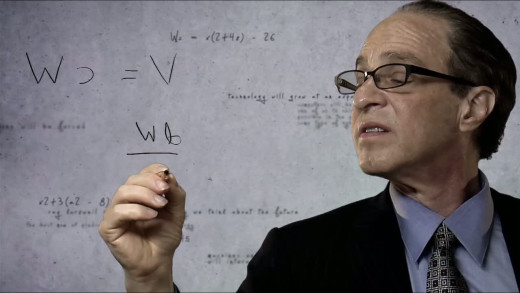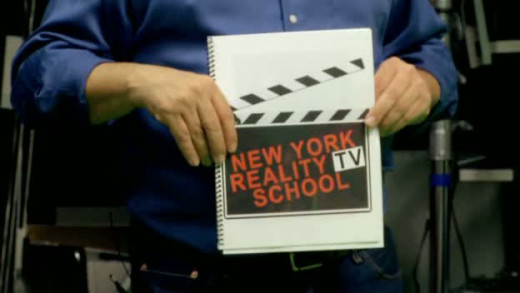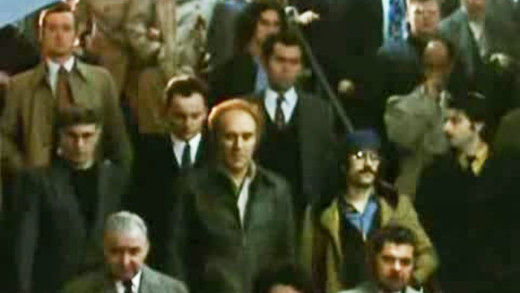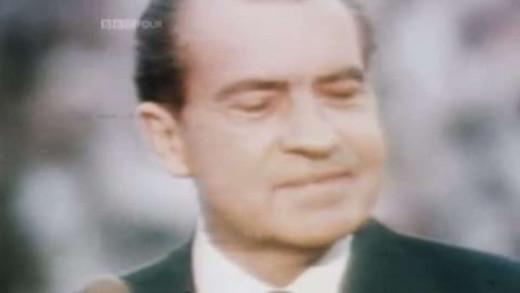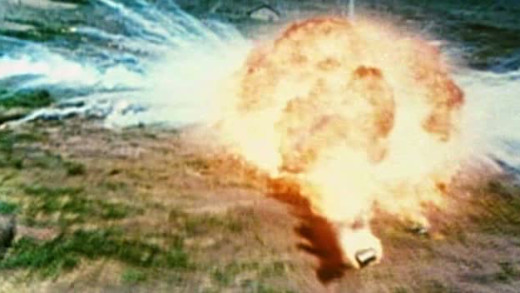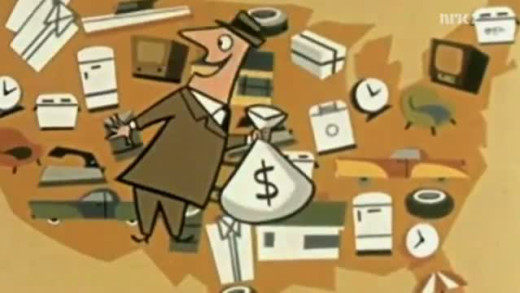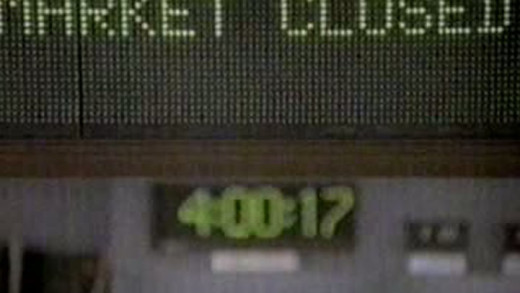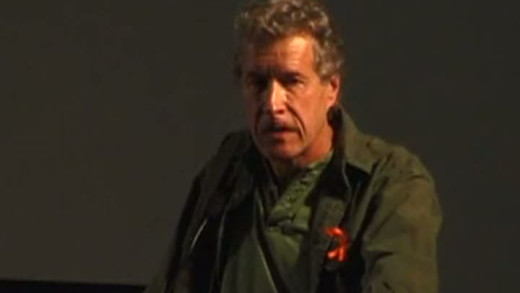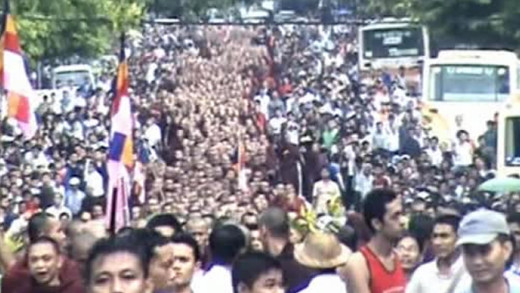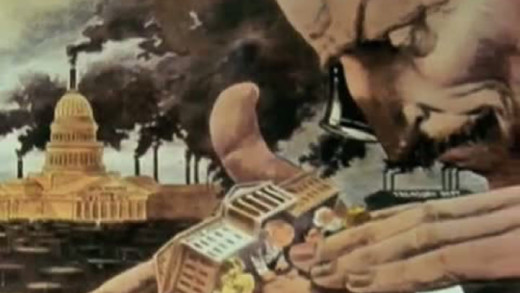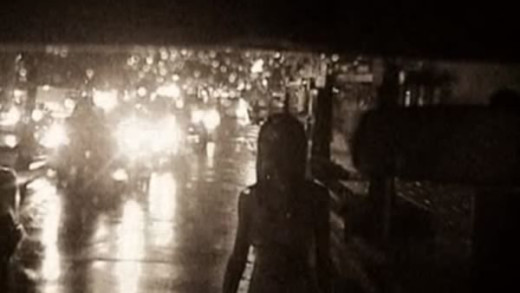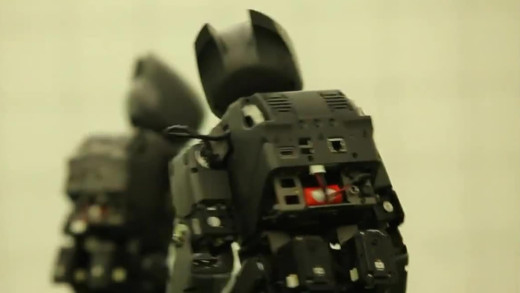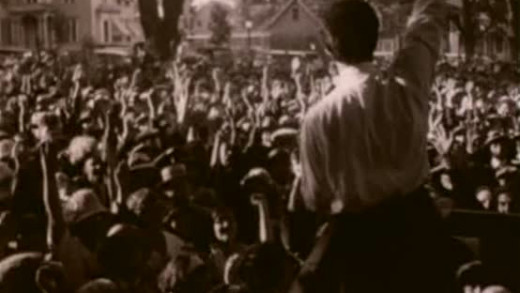On the eve of the Australian government's release of its controversial climate change legislation, reporter Liz Jackson investigates the relentless lobbying campaign conducted over the past 12 months by both environmentalists and industry. Who has won out? Will Australia have an emissions trading scheme, as the government has promised, by 2010?
This short film chronicles a metamorphosis of mainstream media and political power throughout the last decades, by looking at the role of the television journalist. In the early 1950s, not long after the invention of television itself, TV journalists essentially served as prompters for government figureheads and official viewpoints. This function changed somewhat however, with the political scandals of the 1960s and 70s, exemplified by Watergate, where some journalists joined the mainstream shift in society of questioning political power, big business and bureaucracy. Out of this boomed a new era of investigative journalism. But this ended with the fall of the Berlin Wall as the old certainties of "good and bad" and "right and left" were blurred and no longer simple. But rather than working to make sense of the complexity, journalism turned from moral principles to a simple reporting of experience, devoid of context. TV journalists now plead with the audience to send in photos and videos as a kind of so-called "democratised" media, but what actually functions as a vast echo-chamber of uncertainty and unaccountability.
What stories do contemporary music videos tell about girls, women, boys, men, sexuality and gender? What are the cultural values portrayed? And from whose perspective? Dreamworlds encourages viewers to consider how these narratives shape individual and cultural attitudes about sexuality. Illustrated with hundreds of examples, the film accounts both the continuing influence of music videos and how popular culture generally filters the identities of young men and women through a narrow and dangerous set of myths about sexuality and gender; asking viewers to re-look at the images that have been normalised and meanings taken for granted throughout popular culture...
The Power Principle is a series of films examining the history of the United States and the building of its empire with particular emphasis on the last seventy years of United States foreign policy. The methods that make empire possible are also examined—the politics of fear, the rise of public relations, the 'Mafia Principle' and the reoccurring use of fabled enemies, contrasting the Soviet Union and the Cold War alongside the parallels of today with the "War On Terror". Not only does The Power Principle tie together historical events to revive a common thread, the series may also encourage viewers to reconsider their understanding of historical events and the portrayal of them, showing how those in power play a role in manipulating the collective memory through generations.
Santa's Workshop -- Inside China's Slave Labour Toy Factories shows the long working hours, low wages, and the dangerous work and conditions inside these toy factories. Workers who protest or try to organise unions risk imprisonment. Low labour costs and government protections for multinational corporations attract more and more companies to China. Figureheads blame the Chinese suppliers, but they say in the same sentence that increasing competition gives them no option. What and whom to believe?
Ray Kurzweil, noted inventor and futurist, is a man who refuses to accept physical reality and the inevitability of death. Instead, he claims that the trending exponential increase in the growth of information technology can continue indefinitely, and that a so-called "singularity" will emerage—a point where humans and machines will converge, allowing one to "transcend" biological "limitations." But there are many who share deep concerns about the consequences of working towards Kurzweil's world...
The Way of All Flesh traces the story of Henriettta Lacks as she dies of cancer in 1951. Before she died cells were removed from her body and cultivated in a laboratory by scientists in the hope that they could find a cure for cancer. The cells known as the HeLa line have been growing ever since, and the scientists found that they were growing in ways they could not control. The cells transformed modern medicine, the Polio vaccine, but they also became caught up in the politics of our age, shaping the policies of countries and of presidents, and even becoming involved in the cold war, as scientists were convinced that in her cells lay the secret in how to conquer death.
Starsuckers
By planting a variety of fake celebrity-related stories in the UK media and having tabloid newspapers accept them without corroboration or evidence, Starsuckers navigates through the shams and deceit involved in creating a pernicious celebrity culture, uncovering the real reasons behind the addiction to fame and the corporations and individuals who profit from it.
Human Resources -- Social Engineering in the 20th Century is about the rise of mechanistic philosophy and the exploitation of human beings under modern hierarchical systems. The film captures how humans are regarded as a resource by corporations--something to be exploited for pecuniary gain--by following the history of psychological experiments in behaviour modification, conditioning and mind control; applying the outcomes to modern day establishment experiments such as institutionalised education, and social engineering by way of things like television...
Once relegated to the margins of society, pornography is now the most pervasive and visible aspect of popular culture, assuming an unprecedented role in media as its content becomes more harsh and extreme, racist and abusive. This eye-opening and disturbing film moves beyond frivolous "liberal versus conservative" debate and tackles the real issues surrounding pornography by placing the voices of performers themselves, producers and critics directly alongside the observations of women and men as they candidly discuss the role porn has played in shaping their sexual imaginations and relationships. The Price Of Pleasure reveals a nuanced portrait of how pleasure and pain, commerce and power, freedom and responsibility have become extremely twisted by popular culture, usurping the most intimate area of our lives.
This short film uses the story of Richard Nixon's paranoia to explore how a similar outlook has been perpetuated on the larger social scale by the new media age. Skimming through the evolution of the mainstream media via television and newspapers, this short film comments on how politics has been paralysed by a media that has taken serious threats and sensationalised them, resulting in political cynicism and disengagement, which in-turn feeds a viscous cycle of nihilism and further sensationalist politics and media.
Did you know that the legal system recognises a corporation as a person? What kind of 'person' is it then? What would happen if it sat down with a psychologist to discuss its behaviour and attitude towards society and the environment? Explored through specific examples, this film shows how and why the modern-day corporation has rapaciously pressed itself into the dominant institution of our time, posing big questions about what must be done if we want a equitable and sustainable world. What must we do when corporations are psychopaths?
The War You Don't See traces the history of 'embedded' and independent reporting from the carnage of World War One to the destruction of Hiroshima, and from the invasion of Vietnam to the current war in Afghanistan and disaster in Iraq. As weapons and propaganda become even more sophisticated, the nature of war is developing into an 'electronic battlefield' in which journalists play a key role, and civilians are the victims. But who is the real enemy?
Obey
Obey is a video essay based on the book "Death of the Liberal Class" by author and journalist Chris Hedges. The film charts the rise of corporatocracy and examines the trending possible futures of obedience in a world of unfettered capitalism, globalisation, staggering inequality and environmental crisis -- posing the question, do we resist or obey?
The Light Bulb Conspiracy investigates the history of Planned Obsolescence--the deliberate shortening of product life span to guarantee consumer demand--by charting its beginnings in the 1920s with a cartel set up expressly to limit the life span of light bulbs, right up to present-day products involving cutting edge electronics such as the iPod. The film travels to France, Germany, Spain and the US to find witnesses of a business practice which has become the basis of the modern economy, and brings back graphic pictures from Ghana where discarded electronics are piling up in huge cemeteries for electronic waste, causing intense environmental destruction and health problems.
25 Million Pounds details the collapse of Barings Bank in the mid 1990s primarily by a broker called Nick Leeson, who lost £827 million ($1.3 billion) by speculating on futures contracts. The film contextualises the downfall as the history of Barings Bank was one of the oldest and most prestigious merchant banks in Britain, run by the same family for decades with extensive ties to Britain's elites. But in the late 19th century Barings almost went bankrupt after investing heavily in South American bonds, including backing the construction of a sewer system in Buenos Aires. The bank was saved by The Bank of England, but Edward Baring, the head of the bank, was financially ruined and never recovered. This film explores the culture of Barings and of the financial markets during the 1990s, and how Nick Leeson was able to cause another huge loss of money to the bank, this time bankrupting the company. He did this by claiming fictitious profits on the Singapore International Monetary Exchange and using money requested from London as margin payments on fictitious trades to finance his loss-making positions. It's also the profile of a stereotypical corporate psychopath, as Leeson himself explains how he was able to manipulate those around him to achieve his ends and rationalise his actions.
The Tax Free Tour travels the globe to expose the workings of offshore tax havens and the elite banking systems of the world's billionaires which operate in extreme secrecy. Using examples from multi-national corporations such as Apple Computer and Starbucks, the film traces sizeable capital streams that travel the world literally in milliseconds--all to avoid local laws and paying tax. Such routes go by resounding names like 'Cayman Special', 'Double Irish', and 'Dutch Sandwich'. The Tax Free Tour is a sobering look at how the world's rich live in an entirely different world than the rest of us...
McLibel
McDonald's loved using the UK libel laws to suppress criticism. Major media organisations like the BBC and The Guardian crumbled and apologised. But then they sued environmental activists Helen Steel and Dave Morris. In what then became the longest trial in English legal history, McLibel documents the two activists who represent themselves against McDonald's £10 million legal team with the marathon battle finally concluding at the European Court of Human Rights. The result takes everyone by surprise -- especially the British Government...
Confessions of an Economic Hit Man is a presentation by John Perkins, based on the book by the same name published by him in 2004. Perkins describes the role: "Economic hit men are highly-paid professionals who cheat countries around the globe out of trillions of dollars. They funnel money from the World Bank, the US Agency for International Development (USAID), and other foreign "aid" organisations into the coffers of huge corporations and the pockets of a few wealthy families who control the planet's natural resources. Their tools included fraudulent financial reports, rigged elections, pay-offs, extortion, sex, and murder. They play a game as old as empire, but one that has taken on new and terrifying dimensions during this time of globalisation."
By risking torture and life in jail, courageous young citizens of Burma live the essence of journalism as they document the uprisings against the military regime in 2007. Armed with small handycams, the Burma VJs stop at nothing to make their reports from the streets of Rangoon. Their video footage is smuggled out of the country and broadcast back in via satellite and offered up for use in the international media. The whole world witnesses single event clips made by the VJs, but for the very first time, the individual images have been put together here to tell a much bigger story...
Psywar
Psywar explores the history and evolution of propaganda along with the rise of 'public relations' with an emphasis on the relationship between war, propaganda and privilege...
The Trials of Henry Kissinger examines the evidence of war crimes by Henry Kissinger during his time as the United States "National Security Advisor" and later Secretary of State for President Nixon and President Ford. Acting in the role of the prosecution, journalist Christopher Hitchens presents solid evidence of Kissinger's complicity in a series of war crimes involving Indonesia, Bangladesh, Chile, Cyprus, East Timor and many other countries...
My Sex Robot
Meet Roxxxy, the world's first "sex" robot, and the strange men who've been yearning for "her" as an obedient android "sex partner." Roxxxy's inventor, Doug, is working on finely tuning the robot to be the perfect android sexual "companion" and has a queue of men eagerly awaiting a one night stand with it to test the technology of their fantasies. But how did this come about? My Sex Robot follows the lives of three men in attempt to find out. Delosian remembers from the age of 13 watching Bionic Woman and Six Million Dollar Man and it blew his mind. What he saw triggered his view of an ideal woman. Kaiso speaks of a similar experience sexualising mannequins from department stores. But for Edward, robot sex as already arrived. He has found it by converting his real-life girlfriend into a robot simulation. All these men speak about the power, control, predictability, and obedience that sex robots bring, as opposed to relationships with real human beings. As a result, My Sex Robot presents a startling reality of emerging technologies with already-existing myriad sociological and psychological implications.
As an exposé of human trafficking, Very Young Girls follows a group of adolescent African-American girls who were seduced, abused and sold on New York's streets by pimps, having survived the life to share their story. Each recount their experiences, captured alongside startling footage shot by the brazen pimps themselves, giving a rare glimpse into how the cycle of street life begins for many women. Following the work of Rachel Lloyd and the journey each go through to exit their life on the streets, Very Young Girls portrays first-hand the occurrences of human trafficking throughout the United States.
The myth that humans are superior to all other life forms is a fundamental and unquestioned premise of dominant culture. It is an old historical idea, rooted in colonialism, and is deeply embedded in religion and science. It is one of the root causes for the destruction of the natural world, animal cruelty, war, the extinction of species and other immense problems. The Superior Human? challenges this arrogant and self-destructive ideology; unwinds the myths, using examples and common sense.
Taken for a Ride details the conspiracy led by General Motors to buy up and dismantle public transport lines throughout the United States in the 1930s. Across the nation, tram and train tracks were torn up--sometimes overnight--and diesel buses placed on city streets. The highway lobby then pushed out a vast network of urban freeways that fuelled suburban development, increased auto dependence and elicited passionate opposition...
Over the past decade, the United States military has shifted the way it fights its wars, deploying more technological systems in the battlefield than human forces. Today there are more than 7,000 drones and 12,000 ground robots in use by all branches of the military. These systems mean less deaths for US troops, but increased killings and precision elsewhere for the United States war machine. With lethal drone strikes being carried out in secret by the CIA and occurring outside of officially declared war zones such as Pakistan, Yemen and Somalia, the secret use of robots and drones in this way evokes serious questions about the operations of the United States and what this means for the rest of the world as more and more autonomy is developed for these technologies.
Along the way to winning an eight-hour workday and fair wages in the early 20th century, the Wobblies were one of the few unions to be racially and sexually integrated and often met with imprisonment, violence, and the privations of prolonged strikes. The Wobblies airs a provocative look at the forgotten American history of this most radical of unions, screening the unforgettable and still-fiery voices of Wobbly members -- lumberjacks, migratory workers, and silk weavers -- in their 70s, 80s, and 90s.
